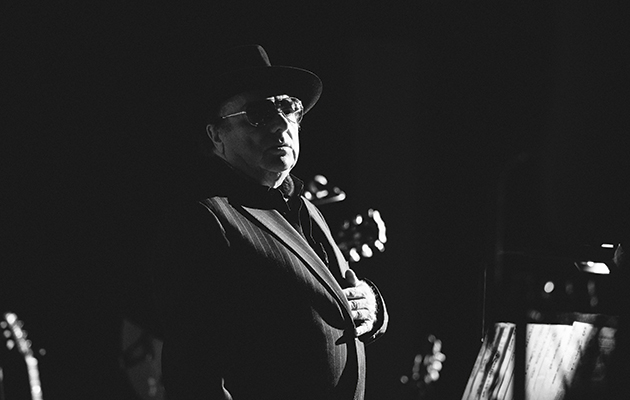What to expect from a Van Morrison concert, then? Morrison, of course, has a reputation as an unpredictable live performer. Anecdotal evidence gathered from around the Uncut office suggests he is just as capable of transcendent moments of sublime mystery as he is of turning in perfunctory, no frills sets. Will he favour the roaming spirit of his peerless Seventies albums, or the blues and R&B numbers from his youth that have become increasingly foregrounded in his live sets? Tonight, there are two additional elements that might inform the tone of tonight’s show. First, this is part of this year’s run of Teenage Cancer Trust shows; a cause that obliges the artist to ensure they’re at their best. Secondly, this show convenient falls close to the release date of his new album, Duets: Reworking The Catalogue, and there is in all likelihood an imperative to support that.
As it transpires, all these things become to some degree relevant. Critically, we get an avuncular Morrison. He is hardly an unstoppable raconteur – he says very little, in fact – but his demeanour suggests he is at the very least enjoying himself. Sauntering on stage a few minutes after his band have started playing the light, jazzy grooves of “Celtic Swing”, he joins in with an expansive saxophone solo. His five piece backing band are dressed soberly in blacks and greys; Morrison himself wears a black suit, hat and sunglasses. I’m reminded to some extent of Dylan’s current touring band: another group of well-drilled musicians who are sensitive and discretely responsive to both the material and the demands of a notoriously capricious frontman. Under Morrison’s current musical director Paul Moran, they hold the line admirably. Admittedly, it’s not that difficult in the early part of the show. No sooner have the band warmed up, than Morrison introduces his new album to the audience and brings on the first of tonight’s duet partners, Clare Teal, for “Carrying A Torch” and “The Way Young Lovers Do”. The vibes are a little Pizza Express Jazz Club; fortunately, Morrison moves on to a persuasive version of “Baby Please Don’t Go” before he is joined by Teenage Cancer Trust founder Roger Daltrey for “Talk Is Cheap”, which never quite lifts off. Perhaps they’re under-rehearsed, but instead of the fiery R&B thrill they’re presumably aiming for, the song feels sluggish where it should swing.
Personally, I find this section of the show a little difficult to get my head round. As he brings out PJ Proby for three songs, including one of Proby’s own and a cover of Sam Cooke’s “Bring It On Home To Me”, it begins to feel suspiciously like two old mates have a laugh. Morrison dwells too long here and what could passably be considered a generous act of sharing the stage with a favourite contemporary begins to feel like an indulgence. Things pick up, though, when Georgie Fame sits in for a handful of songs. This seems to change the shape of the music; the songs become looser, jazzier, fuller. The night’s brief collaboration with Fame culminates in a warm, gently swaying version of “Centrepiece”, which seems to segue into Dylan’s “Corrina Corrina”, lubricated by Morrison’s extraordinary baritone and Fame’s evocative Hammond playing. Fame is followed by Mick Hucknall, who gives a pleasingly restrained and sympathetic reading of “Streets Of Arklow”.
By this point, it’s increasingly hard to guess where Morrison is going with his set. Is this a promo job for the Duets album, an opportunity to dust down some old R&B and soul covers or a leisurely trip through his capacious back catalogue? Or is it all three? And if so, is the balance of material right? But then he pulls out a final clutch of songs that showcase not only his most famous work but also mark a foray into the wild beauty of those Celtic landscapes. “Moondance” appears as its lightest and most delicate, lifted by some nimble sax work from Morrison. “Magic Time” continues to illustrate Morrison at his freewheeling best before we get a galloping “Brown Eyed Girl”. For a finale, he plays magical, meandering versions of “Into The Mystic” and “In The Garden”, rich in wonderment, that transport and elevate.
It’s arguable to a point that Morrison is at a place now where he is entitled to play what he wants, when he wants. Indeed, some might find the digressions into old soul and R&B pleasing in their own right. But there’s enough in Morrison’s own formidable back catalogue that he doesn’t need to dwell too long in other people’s music. We are here for the mystic; and when it finally arrives, it is a most astonishing thing.
Follow me on Twitter @MichaelBonner
You can read the secrets of Van Morrison’s best albums in the new issue of Uncut; in shops now




